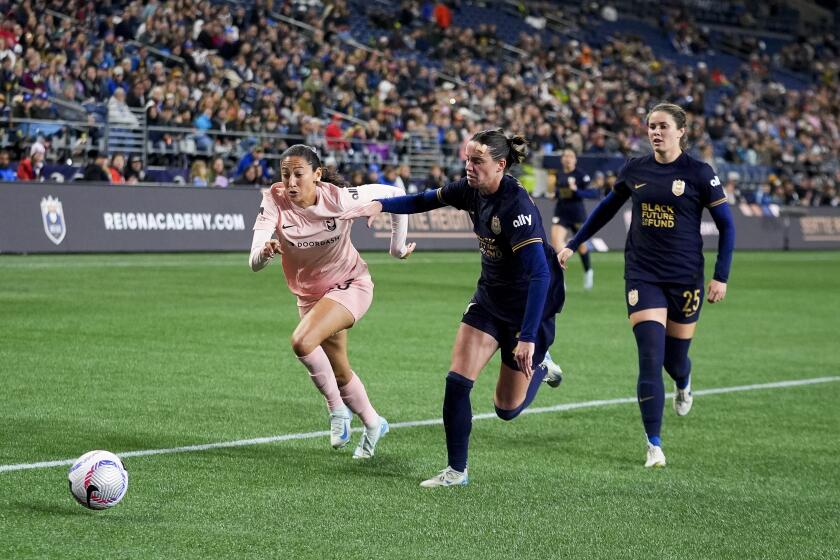FIFA’s Sepp Blatter is out of touch on racism
It was one of the most memorable moments from the FIFA World Cup last year: Before the semifinal matches, players from both teams stood alongside a huge banner that read “Say No to Racism” as their captains read statements condemning prejudice to a television audience numbering in the tens of millions.
That it took place in South Africa, a country whose recent history bears testimony to the pain and futility of racism, made the scene all the more moving.
Too bad FIFA President Sepp Blatter didn’t get the message. Because if he had fully believed the context and importance of the anti-discrimination campaign FIFA launched a decade ago, Blatter never would have made the comments he did this month.
Asked by CNN World Sport about racism in international soccer, Blatter said: “I would deny it. There is no racism. There is maybe one of the players towards another, he has a word or a gesture which is not the correct one. …
“He should say that this is a game. We are in a game, and at the end of the game, we shake hands, and this can happen, because we have worked so hard against racism and discrimination.”
Huh?
During his more than three decades as a FIFA executive, Blatter has earned a well-deserved reputation for spouting half-baked personal opinions before fully considering their impact. (He once suggested female players should “wear tighter shorts and low-cut shirts … to create a more female aesthetic.” And his comments on homosexuality have gone well beyond simple ignorance.)
The reaction to Blatter’s latest blathering was predictably swift — and incredulous. Former English captain Rio Ferdinand wrote on Twitter that he felt duped by FIFA.
“I feel stupid for thinking that football was taking a leading role against racism ... it seems it was just on mute for a while,” wrote Ferdinand, whose brother Anton was the target of alleged racist comments made by current national team captain John Terry.
Terry plays for Chelsea, Anton Ferdinand for Queens Park Rangers, whose manager, Neil Warnock, called for black players around the world to boycott their next international match to protest Blatter’s remarks.
Prime Minister David Cameron called the comments “appalling,” adding that “now is not the time for complacency” in the battle against racism. Others went further, demanding the FIFA president resign.
Resignation may be a bit tough, but Warnock and Ferdinand are right. How sincere can Blatter’s stand against racism be when he clearly doesn’t understand the topic? Racism cannot be erased with a handshake or eradicated by campaigns and platitudes alone.
Officials of U.S. Soccer declined to take questions on the matter but issued a statement calling the comments “inappropriate,” adding that “FIFA has long demonstrated a commitment to limiting racism and we fully support their efforts.”
And, as U.S. Soccer noted, moments after Blatter realized his comments had sparked international outrage he offered a series of apologies.
Well, sort of.
In a statement issued by FIFA, Blatter said he was misunderstood and that he knows “racism unfortunately continues to exist in football and I have never denied this.” Never mind the fact that, about an hour earlier in a taped interview, he had clearly denied racism in soccer.
Later the FIFA chief said he “deeply regretted” using “unfortunate words” but didn’t correct his view that racial insults could be forgotten with a handshake. If anything, his apology showed just how out of touch Blatter is since he admitted he “couldn’t envisage such a reaction” to his comments.
But then Blatter’s controversial and dictatorial 12-year reign as the chief executive of the world’s most popular sport — the 75-year-old was Swiss was re-elected to another four-year team in June — has been dogged by spectacularly misguided decisions and repeated charges of corruption, financial mismanagement and back-room deal-making.
Most recently former FIFA presidential candidate Mohamed bin Hammam of Qatar was accused of trying to bribe Caribbean officials to vote for him in his presidential run against Blatter last summer. As part of the same scandal Jack Warner, a member of parliament in Trinidad and Tobago and a longtime soccer official, was forced to resign as FIFA vice-president and as president of the North American, Central American and Caribbean region, or CONCACAF.
That Blatter has done much good for international soccer is indisputable. Taking the World Cup to once-isolated South Africa, for example, was a noble gesture.
But his time as president has also been marked by a lack of transparency and malfeasance — both real and imagined. So this isn’t the first time Blatter’s leadership has been questioned.
What may be different, though, is this time Blatter appears to have few defenders and few excuses. What he does have is a lot of angry players.
“I have no power with who goes and who stays in FIFA. But there obviously is and has been racism throughout soccer. And life,” said David Beckham, another former English captain. “And it can’t just be swept under the carpet. And it can’t be just sorted out with a handshake.
“That’s not the way of the world and it’s not how racism should be treated. It’s out there and we need to work hard to keep it out of the game and keep it out of life in general.”
Perhaps enough has finally become enough. That the players themselves have reacted so forcefully and swiftly to Blatter’s latest blunder suggests that while the president himself may not have understood the point of FIFA’s “Say No to Racism” campaign, others have gotten the message.
No means no.








